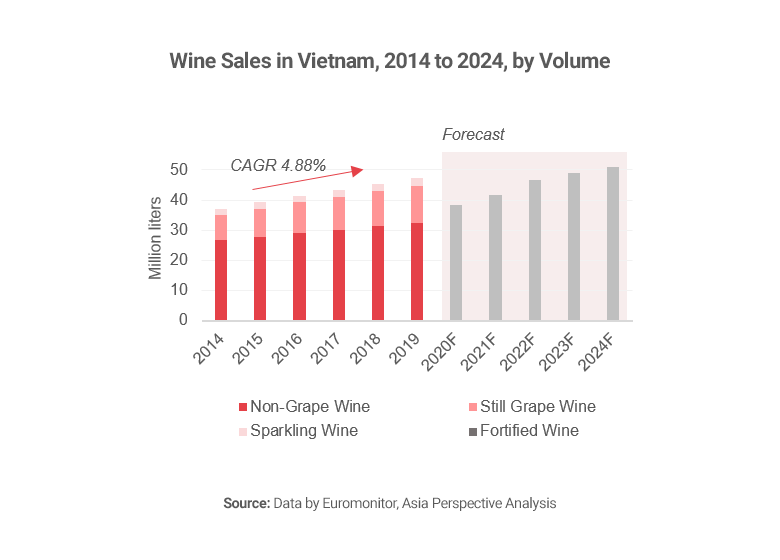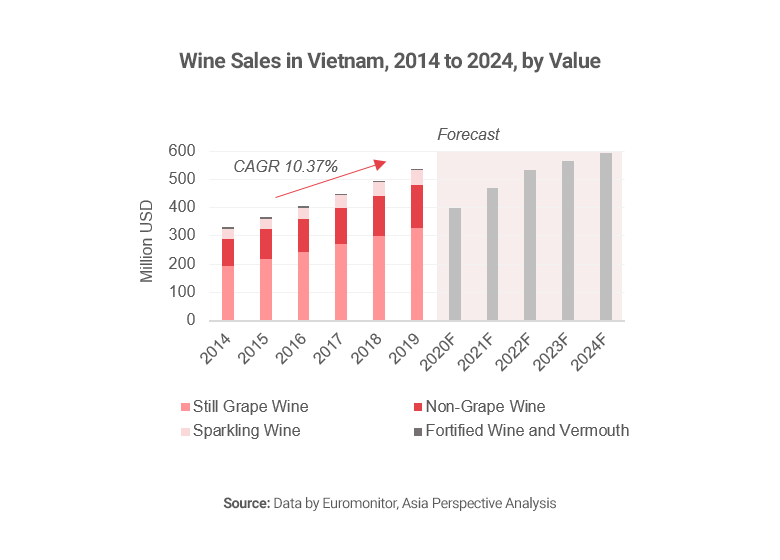Online sales of wine and spirits have been legalized in Vietnam since February 2020, with more transparent regulations of promotion, payments, and customer’s age. With the new laws in place, especially aided by the COVID-19’s push, online sales of wine in Vietnam is expected to grow significantly in the coming years.
The wine market in Vietnam can be categorized into non-grape wine, still grape wine, sparkling grape wine and fortified wine. Non-grape wine (mostly local products) is the most consumed in terms of volume, accounting for 69% of the total consumed wine, but still grape wine (red wine, rose wine, and white wine) accounts for the highest value of the market (61% market share) due to its higher price. Over the past years, the wine market in Vietnam maintained a growth rate of more than 10% per annum. Wine has become more popular among the middle and high-income consumers, especially due to the country’s increasing wealth and disposable income. In addition, the growing influence of the Western culture also accelerates the consumption of wine in Vietnam as it is considered the representation of social status.
In 2020, under the impact of COVID-19 that reduced gatherings that restricted wine/alcohol drinking, the overall consumption of wine is expected to drop by 18.9% from 2019, but then to recover quickly during the years to come.


More than 70% of the wine sold in Vietnam has been through hotel, restaurant and catering services. However, it is expected to drop by 33% in 2020 due to the COVID-19 induced restrictions, including social distancing as well as travel restrictions.
On the other hand, nearly 30% of the wine sold in Vietnam is through retailers. In contrast to hotel, restaurants and catering, sales by retailers are expected to grow by 15% in 2020, especially through online platforms. Besides the fundamental requirements for wine businesses, online wine sellers must prevent minors from accessing information and purchasing alcoholic beverages through e-commerce sites.
In conclusion, due to the COVID-19 pandemic that has limited public gatherings, customers are changing their behavior and getting accustomed to purchasing alcoholic drinks online. On the market, major e-commerce platforms in Vietnam have joined the wine online retail scene and complied with the new regulations. With the green light from the government for e-commerce of wine in Vietnam, the market is transforming itself into a digital-focused industry, gradually taking over parts of physical retail.
Read more about our market entry services or other consulting capabilities.
The insights provided in this article are for general informational purposes only and do not constitute financial advice. We do not warrant the reliability, suitability, or correctness of the content. Readers are advised to conduct independent research and consult with a qualified financial advisor before making any investment decisions. Investing in financial markets carries risks, including the risk of loss of principal. Past performance does not guarantee future results.
The views expressed herein are those of the author(s) and do not necessarily reflect the company's official policy. We disclaim any liability for any loss or damage arising from the use of or reliance on this article or its content. ARC Group relies on reliable sources, data, and individuals for its analysis, but accuracy cannot be guaranteed. Forward-looking information is based on subjective judgments about the future and should be used cautiously. We cannot guarantee the fulfillment of forecasts and forward-looking estimates. Any investment decisions based on our information should be independently made by the investor.
Readers are encouraged to assess their financial situation, risk tolerance, and investment objectives before making any financial decisions, seeking professional advice as needed.




